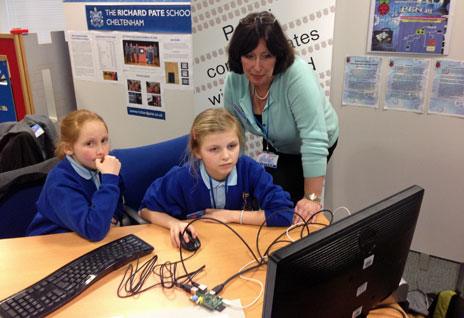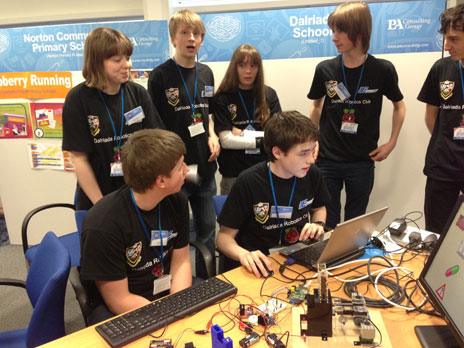The life of Pi - clever ideas with a tiny computer
- Published
- comments

While the Chancellor was delivering his budget yesterday, I was in a room near Cambridge full of young people who may be part of the answer to Britain's economic future.
They had all come up with clever ideas to use the Raspberry Pi, the ultra-cheap computer developed in Cambridge, and they were the finalists in a competition, external held by the technology advisors PA Consulting.
I was one of the judges deciding who should win - and it was a tricky task.
There was the London primary school with a plan to recycle old computer components to turn the Raspberry Pi into a communications device for schools in developing countries. Their only problem - they couldn't figure out how to make Skype work on the little device,
Then there was the North Yorkshire community school which had turned the Pi into an RFID (radio-frequency identification) reader to measure lap times in their cross-country races, and the London independent school whose pupils had come up with Teacher's Pet, a way of delivering homework via USB sticks plugged into the tiny computer.
But the winners combined great teamwork with excellent use of both the Raspberry Pi hardware and inventive programming.
A team from a Cheltenham primary school came up with a system to help elderly or disabled people answer the door with a wireless keypad, using the Piface attachment for the Raspberry Pi.

Dalriada School students with their winning entry
Dalriada School from Ballymoney had invented a pill dispenser which allowed a GP to control what drugs a patient was taking at home. The boys and girls from the school, while wrestling with a demo which had a few teething problems, gave a compelling presentation of the need for the product and the design challenges involved in manufacturing it.
And two sixth-formers from Westminster School had the most polished and commercially attractive idea of them all, the AirPi. It combined various sensors with some clever programming to turn the Pi into an air quality and weather station.
They've even put up a site, external explaining how anyone could copy this idea, and building a community around the project.
If the idea behind the Raspberry Pi was to inspire a new generation to look under the bonnet of computers and get their hands dirty, these schools seemed to show it was working.
And if just a few take their ideas further and decide to start their own businesses or compete for jobs needing computer science skills, then that could make a big difference to the UK's competitiveness.
The judges did have one concern - just how few entries there had been from state schools.
One theory was that the constraints of the curriculum meant teachers were too cautious about committing the time to time-consuming projects which might not contribute directly to exam results.
Which if true, is a pity.